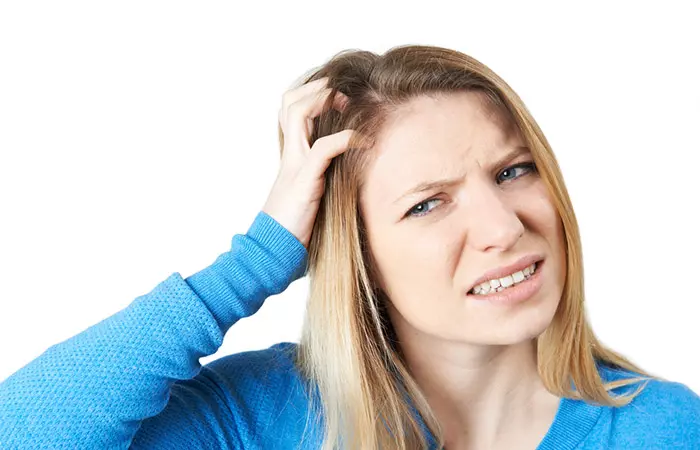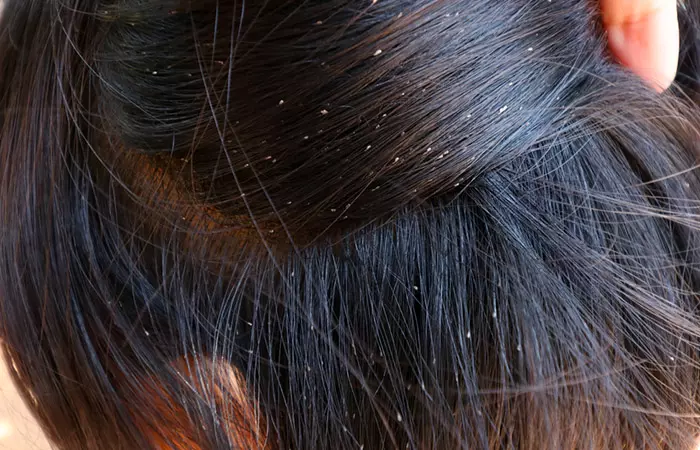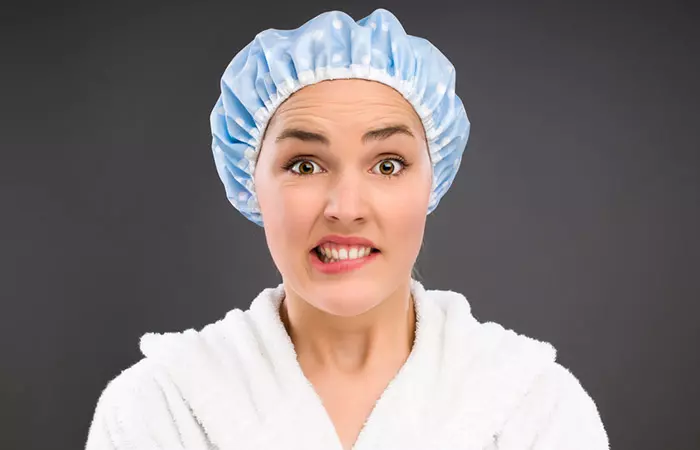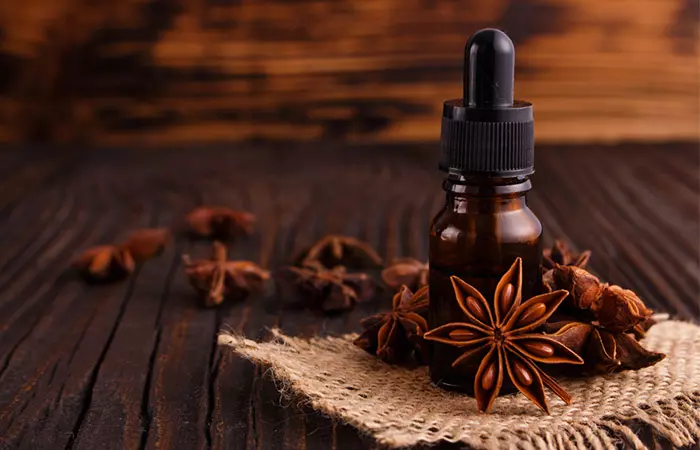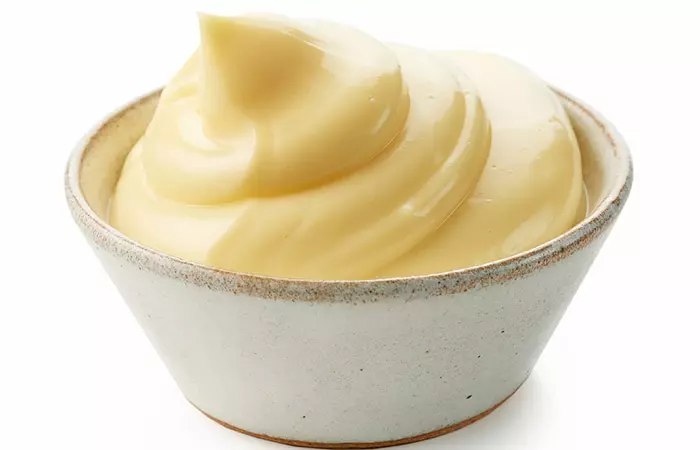Here, we explore the possibility of using Listerine to eliminate head lice. We also look for any scientific evidence available. Keep reading to know more.
Ingredients In Listerine
Listerine contains the following active compounds:
Alcohol (30%) Eucalyptol Menthol Methyl Salicylate Thymol
The inactive ingredients include:
Water Alcohol (26.9%) Benzoic acid Poloxamer 407 Sodium benzoate Caramel
Can Listerine Mouthwash Kill Lice?
Listerine contains alcohol and is hence believed to work against head lice. Research suggests that alcohol may suffocate and kill lice (2). Some claim the very alcohol in Listerine may shun the parasite. Furthermore, the herbal oils in Listerine, like that of eucalyptol, thymol, and menthol, and methyl salicylate, may discourage lice. Studies show that thymol (used in shampoos) could potentially reduce hair lice infestation (3). However, there is no evidence stating that Listerine could serve as a permanent solution for head lice.
Does Listerine Work On Lice Eggs?
Listerine may play a role in dislodging lice eggs (also called nits) from hair shafts and killing them. Lice eggs contain a protective, waxy coating that saves them from water damage and allows them to evolve into nymphs. The alcohol in Listerine seems to dislodge this waxy material and removes the adhesion with the hair shaft. As a result, the eggs may either fall off or become easier to be uprooted. Some believe the alcohol in Listerine may suffocate the nits by cutting off their oxygen supply. Research is limited in this regard. The impact of Listerine on lice seems to be negligible. This is so because nits can lie dormant until the mouthwash dries out and may hatch again later under favorable conditions. Listerine may not be as effective in killing head lice as previously thought. But is it safe? Or does its use cause any harm?
Is Listerine Harmful?
There is limited research here too. Some believe that the alcohol in the mouthwash may enter your bloodstream by penetrating the scalp. Listerine use on kids below the age of 12 is not recommended. The alcohol in Listerine may also sap moisture. It may dry your hair out and make it brittle. It could irritate your scalp too. This burning sensation, along with the lice infestation, could cause serious discomfort. In kids, alcohol may damage the hair follicles.
Why Is Listerine So Popular As A Treatment For Head Lice?
The presence of alcohol in Listerine could have made it quite popular for lice treatment. The alcohol could make a small, if not majorly impactful, contribution in helping eliminate head lice. It may help remove nits from the hair shaft. While the efficacy of Listerine in eliminating head lice is unclear, you may still use it. Anecdotal evidence states that it may have some benefit. In the following section, we discuss how to use Listerine.
How Can You Use Listerine To Kill Lice?
Fariha Farhana Ahmed, a blogger, tried Listerine for head lice and shared her experience in one of her blog posts: “I took Listerine mouthwash in a spray bottle and sprayed my scalp and my hair with it. I kept it on for an hour and then washed it well with loads of shampoo. The result was unbelievably good. I got rid of most of my lice and nits! (i)” You may also go for other natural alternatives that could be far more effective in killing head lice. We have discussed the same below.
What Are The Other Natural Alternatives To Kill Lice?
Anise Oil
Anise oil is one of the most effective natural home remedies for lice removal (4). It suffocates lice and reduces the risk of reinfestation.
Coconut Oil
Pure coconut oil was found to be effective in killing head lice (5).
Petroleum Jelly
In studies, petroleum jelly was found to cause significant louse mortality (6). While its application and removal can be messy, it can be a great alternative for those allergic to medicated shampoos and essential oils.
Mayonnaise
Some research suggests that mayonnaise kills head lice by suffocating them, but only if applied liberally for at least 12 hours. It helps lubricate the hair and makes it easy for one to comb out the lice. It also may help remove lice eggs from the scalp (7).
Wet Combing
Wet combing for lice is perhaps one of the oldest traditional methods in the book to get rid of these stubborn pests. A mass screening study conducted in Belgium showed wet combing to be a widely popular lice eradication method and showed 51% of subjects to be completely cured of it while 24% became nit-free (8). The method is quite simple. Wash the hair with a lice-stunning shampoo and use generous amounts of conditioner to make the combing process easy. Towel-dry the hair and thoroughly comb out each section from root to tip with a fine-toothed comb. Then, wipe the comb on a white towel or tissue to remove the lice and nits from between the teeth. Repeat these sessions every 4 days for 2-3 weeks for the best results. The following is a list of effective oils for head lice prevention. Keep reading to learn how to incorporate them into a potent lice treatment solution.
Lavender oil Neem oil Tea tree oil Eucalyptus oil Clove oil Cinnamon leaf oil Peppermint oil Red thyme oil Nutmeg oil
Combine 15 to 20 drops of any of the oils above with olive oil and apply the mixture directly to your scalp. Leave it on for 12 hours and comb out the lice. Follow by shampooing and conditioning your hair. Repeat the procedure once every 5 to 7 days. Final Words How long does it take Listerine to kill lice? It takes about 6 to 24 hours for the alcohol in Listerine to suffocate the lice and eggs. What kills head lice fast? There are specially formulated lice treatments, like creams, ointments, and solutions, that can eliminate head lice. Does hydrogen peroxide kill lice? Hydrogen peroxide might be able to eliminate lice. Hair dyes containing hydrogen peroxide mixed with bleaching agents are said to kill lice and their eggs. Can I use Listerine on my itchy scalp? Anecdotal evidence suggests that Listerine may treat an itchy scalp. It contains eucalyptol, menthol, and thymol, which soothe and refresh the scalp. Does hairspray kill head lice? Some anecdotal evidence suggests that hairspray can suffocate lice. However, more research is needed to prove this claim. Are insecticides used to kill lice? Insecticides like Allethrin, Permethrin, and Pyrethrins are prescription insecticides that have been used for decades to treat head lice. Recent reports suggest that lice may have become resistant to these over long-term usage. Learn how to use Listerine to get rid of lice quickly and easily with this step-by-step tutorial. Get rid of those pesky critters in no time by clicking on the video below.
